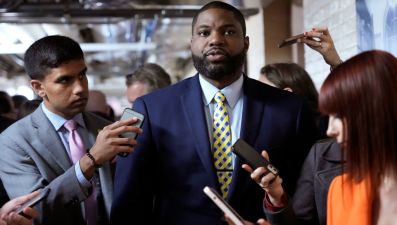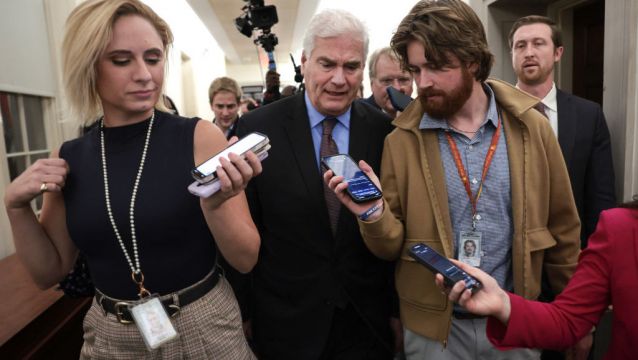Republicans in the US House of Representatives on Tuesday will try again to fill a leadership vacuum that has paralysed the chamber for three weeks and left Congress unable to tackle urgent funding requests for Israel and Ukraine.
The 221-member Republican majority in the House is due to gather at 9am ET (1300 GMT) for a series of closed-door votes to choose a nominee from eight candidates for speaker, a position that has been vacant since October 3rd.
It is unclear whether any of them can unite the party. But after three weeks of infighting, some Republicans predicted that a new speaker could be elected on the House floor quickly.
"People are so discouraged by what's happened the last three weeks that they want to come together," representative Don Bacon said after a 2-1/2-hour candidate forum on Monday evening.
Mr Bacon told reporters that the House could have a new speaker by Tuesday night, adding: "I'm hopeful for it."
Candidates include representative Tom Emmer, who as the No. 3 House Republican can point to leadership and campaign fundraising experience that normally would make him a strong candidate for the post.
But Republicans have already rejected two leaders with those skills. Kevin McCarthy was ousted as speaker by a small group of Republican insurgents on October 3rd, and his No 2, Steve Scalise, dropped his own bid the following week when he was unable to line up enough votes to win the job.
Mr Emmer faces seven other rivals from his party's right flank, including Representatives Byron Donalds and Kevin Hern.
Republicans have already rejected the most prominent member of that faction, representative Jim Jordan, who was dropped as their nominee after losing three floor votes last week.
Other candidates, like representative Mike Johnson, are running as bridge builders who promise to unite the party after weeks of arguing and death threats.
Divided Republican Party
Some Republicans question whether that is possible. On Monday, however, several said party unity could be more easily achieved after lawmakers spent the weekend hearing from constituents angered by the stalemate.
"Americans are looking at us right now, and they're not thrilled," representative Anthony D'Esposito said. "There's a feeling that people want to get back to work. We want to move this country forward."
The infighting has left the House unable to respond to president Joe Biden's $106 billion request for aid to Israel, Ukraine and US border security. Congress will also have to act before a November 17th deadline to fund the US government and avert a partial shutdown.
Republicans control the House by a narrow 221-212 margin, which means they can afford no more than four defections on partisan votes. Some 25 Republicans voted against Mr Jordan's speaker bid last Friday.
With Democrats united in opposition, Republicans will have to ensure they have 217 votes of their own.
Republicans are expected to hold several rounds of closed-door ballots to settle on a nominee before a floor vote that would install a speaker. A nominee is chosen by a simple majority.
But Republicans might keep voting and negotiating in private until their next nominee has locked in 217 Republican votes.
People want to avoid another floor fiasco.
"We'll have a candidate by noon. The question is whether it will then go to the floor," said representative Mike Gallagher.

"People want to avoid another floor fiasco," he added.
Democrats have said they are open to a compromise candidate that would allow the chamber to function. Many Republicans have said on principle that they would not back somebody who had support from the opposition party.
But things could change if Republicans prove unable to choose a speaker in coming days.
"Every hour that this goes by, members get closer and closer to wanting to try unconventional approaches," said representative Dusty Johnson.







